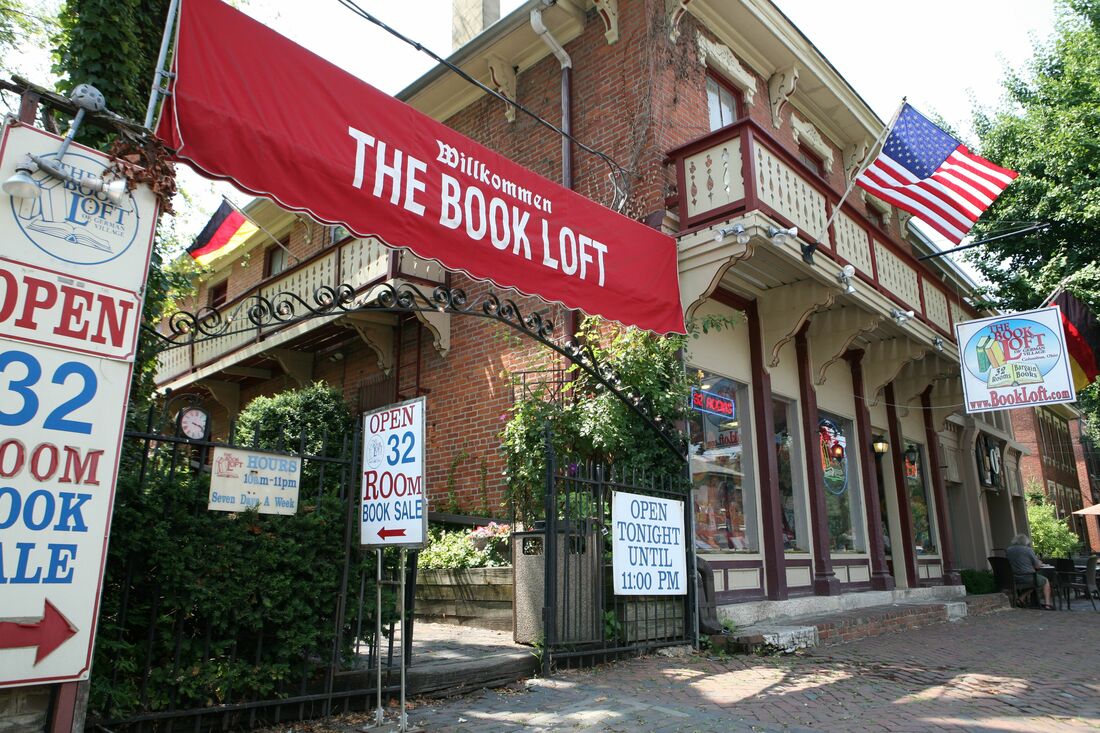|
Whoa, sorry it's taken me so long to get this post up today. I haven't been able to access my server, Weebly all morning, and, techno-dummy that I am, it's taken me all morning to figure out that the problem isn't with Weebly, but with my home internet, which for some reason is being selective in which sites it will let me pull up. Weebly wasn't among them.
Anyhow, as soon as I realized there was nothing wrong with the website I zipped over to the library, where I now am, and here's today's post, finally. Anyway, my sister Romaine offered a comment on yesterday's blog, which began with a story about a man I met at church who came from a small town and who was impressed by the polite propensity of Columbus people to hold doors. Here's what Romaine, who lives in Portland, Oregon, had to say: "I think for the most part Portland is also a very polite city. It would be an interesting experiment in one of these small towns to see if a few people start holding the door and see if it catches on to the general populace. As humans we have "mirror neurons" - which cause us to respond in the same manner in which we are treated. Babies learn to smile because their mommies and daddies smile at them first. If someone frowns at you it makes you feel bad - that's mirror neurons too. Maybe the same could happen with politeness. If people start being polite to others, it causes the recipients of the politeness to respond in kind. That's how we are wired." I thought the data about "mirror neurons" was interesting and thought-provoking, kind of a scientific underpinning for "Do unto others as you would have them do unto you." Maybe when Jesus said that he was really just giving us some advice. And though I also like the the idea of running a politeness experiment in the social petri dish of a small town - introduce a polite behavior, see if it grows - the man from my church who talked about the absence of door-holding in his town seemed to feel that it was not so much politeness that was lacking in the town as friendliness. Not that the town wasn't a friendly enough place to live - provided one belonged to the social group made up of those who moved in the town's circle of influence. Those who belonged. Those whose parents and grandparents had belonged. The Star-bellied Sneeches, as it were. The man and his wife finally moved away after having felt like outsiders for the 40 years that they lived, worked, and raised children in that town. They weren't from the town, and in that small patch of Eastern Ohio that kind of thing mattered. I asked the man and his wife if they thought that the people of their town just happened to be particularly close and cliquey. No, the man said, he thought all small towns were probably that way. Now, never having lived in a small town - I'm a city-girl down to the bone, though I can happily abide suburban-but -close-to-the-city- living - I couldn't personally confirm or deny the man's experience, but just by coincidence after I came home from church where I'd talked to the man and his wife I started reading the New York Times Sunday op-ed section where there was an essay by writer Reyhan Harmanci entitled "Giving Up My Small-Town Fantasy." The writer and her husband had moved from San Fransisco to Hudson, New York with the dream of living a simpler life. But, as Ms. Harmanci learned, "Living in a small town....is complicated." In her essay she writes of the difficulty she and her husband Patrick had making social connections: "For the first time since college, I became depressed. Listless, I spent long hours lying in bed... Patrick and I became lonely together...Maybe things would have been different if we had done a better job of integrating into the community. But while meeting people happened easily enough, making friends — laying down roots — proved difficult... my connection to the community seemed only geographical. Often, it just wasn’t enough to cement relationships." The writer and her husband finally gave up on trying to live in Hudson. She writes: "By early this year, I had had enough. It was time to move to the city. Patrick felt torn about leaving such a cheap setup for writing, but as the snows continued into March, he saw the wisdom of a more connected life. In August, I began a job in Manhattan..." The experience of the writer and her husband seemed so similar to that of the man and his wife whom I'd just talked to that I subsequently decided to ask a friend of mine who grew up in a small town before moving to Columbus if she could identify with these versions of life in small town. Absolutely, said my friend, who's observation was that in small towns people's social status gives them a sense of importance because it's all they really have, especially in economically depressed communities. They sometimes don't warmly welcome newcomers because they don't want any changes to the the social status quo. On the other hand, both my friend and the couple from church agreed that life in a small town can be good - for those who belong and those who fit in. Which I guess for this city girl begs the question: Is living in a small town like spending your life in middle school?
2 Comments
Romaine
9/12/2014 05:21:38 am
When I lived in Philadelphia I was often told "You belong in California". When I ended up in California for work and living in San Francisco Bay area I was often told "You belong in Berkley". Since I moved to Portland no one has told me I belong any place else - so it's possible to be a big city and still not fit in too. Just saying.
Reply
Patti
9/12/2014 05:37:45 am
So true! I'll bet I could find lots of stories from people who have experienced unfriendliness or, as you pointed out, feelings of not fitting in in a big city. I guess we're lucky if we eventually find our place where we feel like we belong. I definitely feel like you fit in great in Portland!
Reply
Leave a Reply. |
"Tropical Depression"
by Patti Liszkay Buy it on Amazon: https://www.amazon.com/dp/B0BTPN7NYY "Equal And Opposite Reactions"
by Patti Liszkay Buy it on Amazon: http://amzn.to/2xvcgRa or from The Book Loft of German Village, Columbus, Ohio Or check it out at the Columbus Metropolitan Library
Archives
July 2024
I am a traveler just visiting this planet and reporting various and sundry observations,
hopefully of interest to my fellow travelers. Categories |






 RSS Feed
RSS Feed